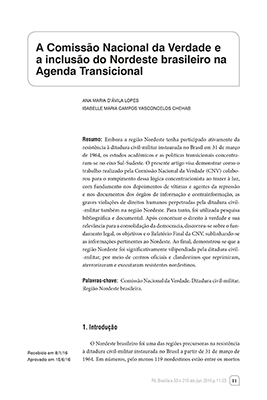O Incidente de Resolução de Demandas Repetitivas introduzido no Direito brasileiro pelo Novo Código de Processo Civil
Vallisney de Souza Oliveira
Resumo
O novo Código de Processo Civil brasileiro, em vigor desde 18 de março de 2016, criou o Incidente de Resolução de Demandas Repetitivas (IRDR), técnica de processamento e julgamento pelo tribunal de justiça ou pelo tribunal regional de causas civis repetitivas e idênticas propostas em diversos juízos, varas e comarcas, sobre matéria unicamente de direito, quando houver risco de violação à igualdade entre litigantes e à segurança jurídica. Apresentado o pedido de instauração do incidente pelas partes e por outros legitimados, cabe a órgão colegiado dizer se dá ou não prosseguimento no tribunal. Se admitido o IRDR, suspende-se a tramitação dos demais processos idênticos e, após ampla publicidade, faz-se o julgamento do mérito, quando serão criadas as teses jurídicas visando a uniformizar e pacificar a jurisprudência. Essa decisão do tribunal passa a ter efeitos erga omnes, valendo para todas as pretensões individuais ou coletivas idênticas no âmbito de atuação daquele tribunal.
Palavras-chave
Incidente de Resolução de Demandas Repetitivas. Inovação. CPC/2015. Pressupostos, sujeitos, procedimento e julgamento do incidente. IRDR e casos repetitivos. IRDR e princípios constitucionais.
Título, resumo e palavras-chave em inglês
THE REPETITIVE DEMANDS RESOLUTION INCIDENT INTRODUCED IN BRAZILIAN LAW BY THE NEW CODE OF CIVIL PROCEDURE
ABSTRACT: The New Brazilian Civil Procedure Code, which entered into force on March 18, 2016, created the incident Repetitive Demands Resolution (IRDR), which is considered along with the judgment technique of repeated appeals to the Supreme Court and the STJ as legislative solutions to the multiple and incessant repetitive civil cases that build up in the Brazilian Justice. The IRDR is the processing technique and judgment by the Court of Justice or the regional court of repetitive civil cases and similar proposals in several judgments, sticks and counties, on a matter only of law, when there is a risk of violation of equality between litigants and legal certainty. The request for establishment of the incident by the parties and other legitimate, it is the collective body say whether or not proceed in court. If admitted the IRDR suspended the processing of other similar cases, and after extensive publicity, it is the judgment of merit, will be created when the legal arguments seeking to unify and pacify the law. This court decision is replaced erga omnes, valid for all individual or collective claims identical in that court action scope. The IRDR is also examined in the face of repetitive cases and constitutional procedural principles.
KEYWORDS: INCIDENT DEMANDS REPETITIVE RESOLUTION. INNOVATION. CPC/2015. ASSUMPTIONS, SUBJECTS, PROCEDURE AND JUDGMENT OF THE INCIDENT. IRDR ANDE CASES REPETITIVE. IRDR AND CONSTITUTIONAL PRINCIPLES.
Como citar este artigo
(ABNT)
OLIVEIRA, Vallisney de Souza. O Incidente de resolução de demandas repetitivas introduzido no direito brasileiro pelo novo Código de processo civil. Revista de informação legislativa: RIL, v. 53, n. 210, p. 63-80, abr./jun. 2016. Disponível em: <http://www12.senado.leg.br/ril/edicoes/53/210/ril_v53_n210_p63>.
(APA)
Oliveira, V. de S. (2016). O Incidente de resolução de demandas repetitivas introduzido no direito brasileiro pelo novo Código de processo civil. Revista de informação legislativa: RIL, 53(210), 63-80. Recuperado de http://www12.senado.leg.br/ril/edicoes/53/210/ril_v53_n210_p63
